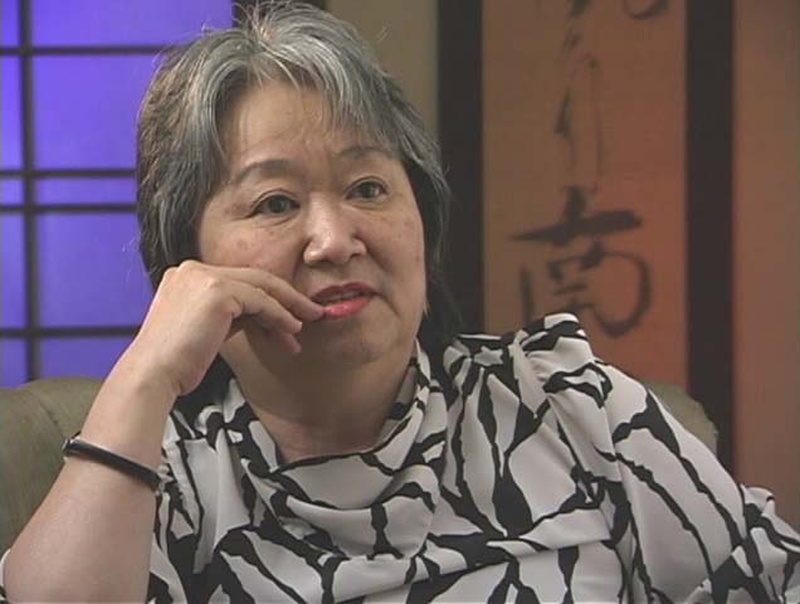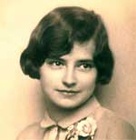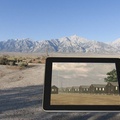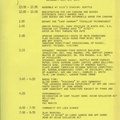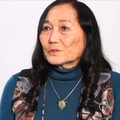Public hearings - 1981
The hearings, held across the US from July to December, came to Seattle when Mako Nakagawa's father, who was busy thinking about who to invite to his 88th birthday celebration, decided that it was important to testify at the hearings and so he went with his daughter.
My father was hard of hearing, so we decided on a signal. I tapped him lightly on the shoulder three times, "Pon, pon, pon," which meant, "Start, Dad. You can talk about anything you want." "When you finish talking, I'll translate it into English and then read your testimony. Got it?" My father said, "Okay, I got it," and sat down in his chair. I waited a little while for everyone in the hall to calm down, then I brought the microphone close to my father's mouth and gave him the signal, pon, pon, pon. Then my father suddenly said, "Can I start now?" in a really loud voice, which made the audience burst into laughter.
"I will be 88 next year," my father began. I wondered whether the committee members listening to him would understand the meaning of 88, but he didn't care and continued to say things like, "I have been blessed with eight grandchildren," and "I came to America in 1913." I took the microphone from my father, translated it into English, and then read my father's testimony. At some points, I felt like my throat was tightening, but I managed to complete the important task. 1
Mako saw that the grandfather's hands were shaking when he testified shortly afterwards and thought, "There must be people who are more nervous than me." The grandfather began to speak in Japanese. His daughter got sick in the camp, and the internment clinic couldn't handle it, so she was transferred to an outside hospital. Hearing that the hospital had requested that the family come immediately, Mako guessed that he probably hadn't been allowed to leave and thought, "I can't listen to my grandfather's story any more. I'm so emotional now, I can't calmly listen to such a sad story. Especially now, sitting on the podium, I can't cry in front of so many people." Then the grandfather quietly continued, "I was allowed to go to the hospital," and Mako was relieved. However, since the grandfather was a prisoner of war in a detention camp under the jurisdiction of the Ministry of Justice, he needed an escort to go out, and he needed money to hire that escort. The grandfather continued calmly. "I didn't have the money. I didn't go. My daughter died." Mako no longer cared about anyone and just let the tears flow from his eyes.
After witnessing the first and second generation survivors share their experiences, she said, "The hearings made me admire their courage and strength even more. I mean, the courage and strength to come forward publicly after so many decades and say that this was a mistake." This made many young second and third generation survivors proud to be Japanese Americans. 150 people testified in Seattle, and one of them said that testifying had freed them emotionally.
Before I testified (at the hearing), I had felt inferior about my race and cultural background... But after I testified, those inferiorities were swept away from my heart, and I felt like I was reborn. I felt the wonder of living again. I felt like the weight I had been carrying had been lifted from my shoulders, and my heart was empty. After nearly forty years of mental pressure, the prejudice, discrimination, detention, stigma, and suffering were all leaving my body. I felt like my heart had been cleansed.
American Case — 1987
On a spring night in 1942, Gordon Hirabayashi ( Chapter 3 of this series ) was studying with his friends as usual at the Suzzallo Library at the University of Washington when a friend called out to him, "Hey, it's five minutes until the curfew." The curfew for Japanese Americans was from 8 p.m. to 6 a.m. Hearing this, Gordon hurriedly gathered up the notebooks and pencils he had spread out on his desk and ran toward the YMCA near the university where he was staying, but he suddenly realized, "What am I doing? There is no reason why I, an American citizen, should have to obey this curfew." He returned to the library and continued studying with his friends. Gordon refused to register not only for the curfew but also for the forced eviction. In May, he went to the FBI office himself with a letter explaining his reasons, and after helping all the Japanese people in Seattle board buses to the temporary internment camps, he was arrested. "As an American citizen, I wanted to uphold the principles of the Constitution. The fact that curfews and evictions are imposed only on one race is antithetical to the principles of the Constitution. I cannot accept being treated as a second-class citizen in a white society. "
Gordon was found guilty in a trial that went all the way to the Supreme Court in 1943, but about 40 years later, he received a phone call. It was from Professor Peter Irons of the University of California, San Diego, who told him that the Department of Justice had concealed documents from the Department of the Army that would have been important evidence in Gordon's Supreme Court decision. The documents had been found, and when asked if he would be willing to go to court again, Gordon replied, "I've been waiting for this phone call for 40 years." He also said, "This case is not just about me, and it's not just about Japanese Americans. It's an American case that concerns the basic human rights of all Americans."
In a retrial in 1987, his conviction was overturned, and in 2012, he was awarded the Presidential Medal of Freedom, the highest award given to a civilian, for his courage during wartime. At this year's Remembrance Day in Seattle, a symposium was held, inviting people connected to Gordon Hirabayashi. As I was handing out programs at the entrance to the venue, I happened to see Henry Miyatake with a cane. It was a very sudden event, and I didn't have time to even say hello, but I hope I was able to convey my gratitude to him. 5
Continued >>
Notes:
1. Mako Nakagawa, interview by Lori Hoshino, May 27, 1998, Densho Visual History Collection, Densho.
2. Mako Nakagawa, interview by Lori Hoshino, May 27, 1998, Densho Visual History Collection, Densho.
3. See above, "Japanese American Ethnicity: Changes through Internment and the Reparations Movement"
4. Courage in Action: the Life and Legacy of Gordon K. Hirabayashi , Gordon Hirabayashi Symposium, February 22, 2014 at Kane Hall, University of Washington, commemorate 2014 Day of Remembrance.
5. For the same reason, Fred Korematsu and Min Yasui were also acquitted in retrials.
*Reprinted from the 137th issue (April 2014) of “Children and Books,” a quarterly magazine published by the Children’s Library Association.
© 2014 Yuri Brockett


